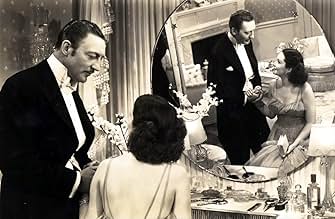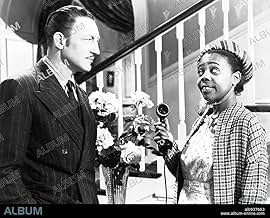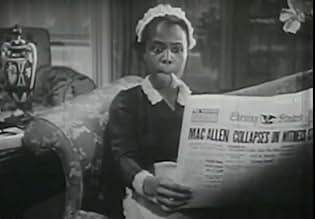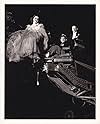A prosecutor trying a case where a husband shot his adulterous wife begins to suspect that his own wife is having an affair, and starts to have his own thoughts about killing her.A prosecutor trying a case where a husband shot his adulterous wife begins to suspect that his own wife is having an affair, and starts to have his own thoughts about killing her.A prosecutor trying a case where a husband shot his adulterous wife begins to suspect that his own wife is having an affair, and starts to have his own thoughts about killing her.
- Director
- Writers
- Stars
Mark Daniels
- Reporter
- (uncredited)
Matty Fain
- Joseph Patterson
- (uncredited)
James Flavin
- Jenks
- (uncredited)
Jack Gardner
- Reporter
- (uncredited)
William Gould
- Prison Warden
- (uncredited)
John Harmon
- Gangster Hitman
- (uncredited)
Grace Hayle
- Lady in Courtroom
- (uncredited)
J. Anthony Hughes
- Murphy
- (uncredited)
- Director
- Writers
- All cast & crew
- Production, box office & more at IMDbPro
Featured reviews
This is a truly original story. Granted, it was done in 1938, but I haven't seen anything quite like it since. That's unusual for Hollywood.
Warren Williams is an obsessed District Attorney who is incapable of any human feeling toward the people he prosecutes. And then a case comes along. A refined, educated, teacher kills his wife in a moment of mad jealousy. Warren has no mercy for him. Coaxes him into a confession with the ultimate goal of executing him.
The gimmick in this story is that, during the trial, he realizes that he is living a parallel life. He has neglected his own wife and come to believe that she is having an affair. After following her to a friends house, he finds himself with a pistol in his hand - a perfect parallel to the case he is trying. It changes his life.
Warren Williams has a tendency to overact, but to hear him bellow in the courtroom, and cackle with glee when he pulls one over on his adversaries, is not to be missed. There is one caution. Is it possible to be too sophisticated? All the other actors are unremarkable, with the exception of Lillian Yarbo who plays the maid. Her lines and expressions are priceless.
If, like me, you long for the days when Hollywood took the time to actually write a coherent script. A time when dialogue really meant something. A time when you second guessed the story and paid attention to the actors - instead of the special effects, take time out for this one. If you can find it.
Warren Williams is an obsessed District Attorney who is incapable of any human feeling toward the people he prosecutes. And then a case comes along. A refined, educated, teacher kills his wife in a moment of mad jealousy. Warren has no mercy for him. Coaxes him into a confession with the ultimate goal of executing him.
The gimmick in this story is that, during the trial, he realizes that he is living a parallel life. He has neglected his own wife and come to believe that she is having an affair. After following her to a friends house, he finds himself with a pistol in his hand - a perfect parallel to the case he is trying. It changes his life.
Warren Williams has a tendency to overact, but to hear him bellow in the courtroom, and cackle with glee when he pulls one over on his adversaries, is not to be missed. There is one caution. Is it possible to be too sophisticated? All the other actors are unremarkable, with the exception of Lillian Yarbo who plays the maid. Her lines and expressions are priceless.
If, like me, you long for the days when Hollywood took the time to actually write a coherent script. A time when dialogue really meant something. A time when you second guessed the story and paid attention to the actors - instead of the special effects, take time out for this one. If you can find it.
Walter Huston famously said that he wasn't paid to sell good lines, but to put across bad ones. He often did. So did Warren William. For both of them, putting across bad lines frequently involved overacting. It's a bit difficult to believe WW being overcome by passion of any sort, and especially any aroused by his boring (though gracious) clothes-horse of a wife (Gail Patrick) in "Wives Under Suspicion," the tame and uninspired 1939 remake by James Whale of his more visually striking "Kiss Before the Mirror" made only five years earlier, but, presumably, too risqué to be rereleased after the Motion Picture Production Code began to be enforced.
Frank Morgan switched roles from defense attorney in the first to defendant in this one, and, unfortunately, Gloria Stuart and Walter Pidgeon did not return. The story is mechanical and has coincidences that strain credulity, but Warren William gave it his all. The only interesting touch was the courtroom set with the judge raised to an exaggerated height.
Frank Morgan switched roles from defense attorney in the first to defendant in this one, and, unfortunately, Gloria Stuart and Walter Pidgeon did not return. The story is mechanical and has coincidences that strain credulity, but Warren William gave it his all. The only interesting touch was the courtroom set with the judge raised to an exaggerated height.
I noticed one of the reviewers complained about Warren William's tendency to over-act. Well, as a fan of the actor, I tend to agree--he DID over-act--and I generally liked his bigger than life and devil-may-care persona. That is why I decided to see "Wives Under Suspicion"--I'd watch just about anything starring this now forgotten star. Sadly, however, this was not one of his better films and it isn't surprising--by 1938, William had moved from his very successful career at Warner Brothers to Universal (a must less prestigious studio at that time) and the budgets were clearly smaller and it showed.
The film begins with William as a gung-ho District Attorney. He lives to prosecute and convict people--and his marriage and personal life have suffered. All he really cares about is winning--and sending as many people as he can to death row. However, when the case of a man who murdered his wife in a fit of anger (Ralph Morgan) is given to him, eventually the parallels between this case and his own sad life became apparent.
I think the biggest problem with this film is that the cast was amazingly limp. Morgan and William were very competent actors, but here they were NOT at their best. In particular, Morgan has a scene where he is supposed to cry but it comes off very poorly--embarrassingly so. In addition, while the story idea is good, the direction and dialog is all either limp or overdone. Director Whale (who made quite a name for himself directing the first two Frankenstein films at Universal) had clearly seen better days and the film failed to impress. It really should have been a lot better given the neat story idea.
The film begins with William as a gung-ho District Attorney. He lives to prosecute and convict people--and his marriage and personal life have suffered. All he really cares about is winning--and sending as many people as he can to death row. However, when the case of a man who murdered his wife in a fit of anger (Ralph Morgan) is given to him, eventually the parallels between this case and his own sad life became apparent.
I think the biggest problem with this film is that the cast was amazingly limp. Morgan and William were very competent actors, but here they were NOT at their best. In particular, Morgan has a scene where he is supposed to cry but it comes off very poorly--embarrassingly so. In addition, while the story idea is good, the direction and dialog is all either limp or overdone. Director Whale (who made quite a name for himself directing the first two Frankenstein films at Universal) had clearly seen better days and the film failed to impress. It really should have been a lot better given the neat story idea.
"District Attorney Stowell" (Warren William) is a man who prides himself on the number of cases he has prosecuted that has resulted in the death penalty. But this notoriety comes with a price because, in order to attain these convictions, he has had to spend a great amount of time at the office--which puts a definite strain on his marriage. Needless to say, when he cancels a vacation at the last minute for a very important case, his wife "Lucy Stowell" (Gail Patrick) doesn't take it too well. Knowing this, he tries to make amends but in doing so he begins to suspect that she has found someone else, and this infuriates him beyond anything he has ever experienced. Even more ironic is that the case he is working on parallels his current situation. Now, rather than reveal any more, I will just say that this was an interesting film which had a decent plot but suffered from a mediocre script and a lack of suspense or passion. That's not to say it was a bad film by any means, but it certainly could have been better and for that reason I have rated it accordingly. Average.
District Attorney Warren William works so hard he neglects wife Gail Patrick. He's ferociously prosecuting a case against Ralph Morgan, accused of killing his wife. Morgan's lawyer tells him it was temporary insanity and wants to bargain it down to manslaughter. Warren laughs at the deal. Then he comes to believe his wife is about to leave him for a lover.
Based on a play by Ladislas Fodor, director James Whale had already made this story as a pre-code, THE KISS BEFORE THE MIRROR. William plays this like he's playing Caesar for Demille. It's an uneasy set of volumes, playing it immense while cross-examining a defense witness, then minutely observing a small detail, then laughing amiably with his office staff. I think he and the director were trying for a manic-depressive character, but William was always deliberate and mannered in his performances. As a result, it's one of those movies that is fascinating to watch, even if it doesn't work. With Cecil Cunningham, Cnstance Moore, William Lundigan, Samuel S. Hinds, and Jonathan Hale.
Based on a play by Ladislas Fodor, director James Whale had already made this story as a pre-code, THE KISS BEFORE THE MIRROR. William plays this like he's playing Caesar for Demille. It's an uneasy set of volumes, playing it immense while cross-examining a defense witness, then minutely observing a small detail, then laughing amiably with his office staff. I think he and the director were trying for a manic-depressive character, but William was always deliberate and mannered in his performances. As a result, it's one of those movies that is fascinating to watch, even if it doesn't work. With Cecil Cunningham, Cnstance Moore, William Lundigan, Samuel S. Hinds, and Jonathan Hale.
Did you know
- TriviaRalph Morgan's (Shaw MacAllen) brother Frank Morgan starred in the original version, The Kiss Before the Mirror (1933), in a different role.
- GoofsWhen Lucy Stowell walks over to the telephone to take a call, she throws the newspaper down on the floor in disgust, and it lands about a foot away from the edge of the rug. She leaves the newspaper there and goes upstairs. When her husband enters the house the next minute, the newspaper is now positioned at the edge of the rug.
- ConnectionsEdited into Haunted Hollywood: Wives Under Suspicion (2016)
Details
Box office
- Budget
- $250,000 (estimated)
- Runtime
- 1h 9m(69 min)
- Color
- Aspect ratio
- 1.37 : 1
Contribute to this page
Suggest an edit or add missing content





































